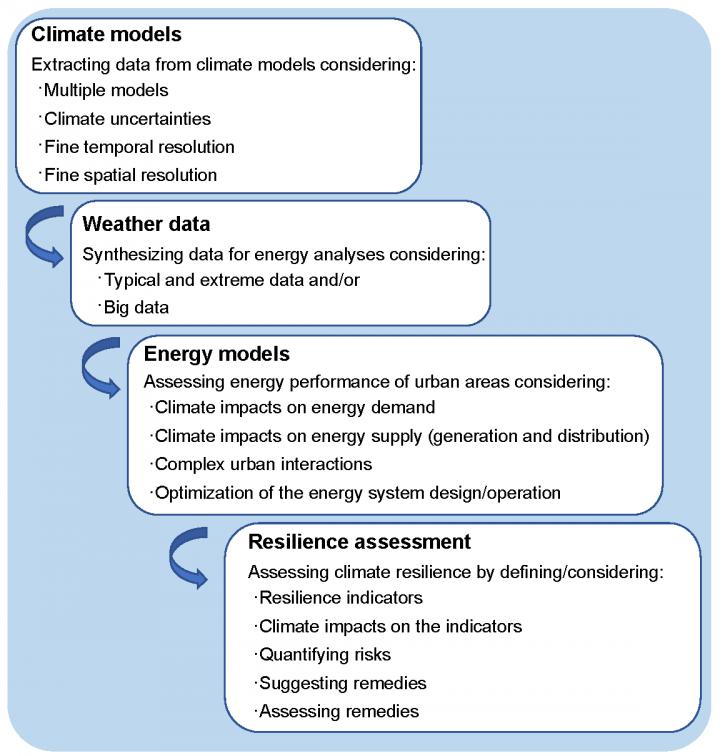
Credit: ©Science China Press
Climate change and increased urban population are two major concerns for society. Moving towards more sustainable energy solutions in the urban context by integrating renewable energy technologies supports decarbonizing the energy sector and climate change mitigation. A successful energy transition is not possible without proper climate change adaptation and considering climate uncertainties and extremes. Failing in climate change adaptation lead to irreversible environmental conditions and heavy economic losses. It is necessary to thoroughly assess the transition pathways and quantify the risks and uncertainties. In this regard, climate resilience can be considered a critical part of climate change adaptation, mostly addressing extreme events and climate disasters. Climate resilience is an emerging concept that is increasingly used to represent the durability and stable performance of energy systems against extreme climate events. However, it has not yet been adequately explored and widely used, as its definition has not been clearly articulated and assessment is mostly based on qualitative aspects.
Nik and colleagues provide an overview of and insight into the progress achieved in the energy sector to adapt to climate change, focusing on the climate resilience of urban energy systems. The state-of-the-art methodology to assess impacts of climate change including extreme events and uncertainties on the design and performance of energy systems is described and discussed. This study reveals that a major limitation in the state-of-the-art is the inadequacy of climate change adaptation approaches in designing and preparing urban energy systems to satisfactorily address plausible extreme climate events. Impacts of climate change, including extreme conditions (and the consequent uncertainties), on urban energy systems are mostly neglected in the energy system design phase, though there are very limited discussions on the operation phase. Most of the available resilience studies are focused on the energy supply, considering traditional and fossil fuel-based energy sources. The available approaches for assessing the resilience are mostly for the spatial scales larger than urban scale and focused on a single aspect. The complexity of the climate and energy models and the mismatch between their temporal and spatial resolutions are two major reasons that the linkage between climate and energy models has not been strong. In this regards some major limitations are inadequate representation of probable future conditions due to limited number of scenarios for future conditions and not considering extreme events, methodological limitations in the energy system design and optimization to address urban complexities, climate uncertainties, extreme weather events, as well as a lack of a clear definition and quantification of resilience and performance gap. All the aforementioned limitations make it difficult to understand the changes required in the superstructure of urban energy infrastructure. This may lead to either over conservative limits for renewable energy integration or even cascade failures and blackouts. The consequences are not limited to the energy sector, but even propagate to other interconnected infrastructures.
Assessing the climate resilience of urban energy systems is possible by considering a wide range of future climate projections and adopting a suitable framework to account for the different components that affect the energy flow in the urban scale, from generation to demand. The multivariate and multiscale variations as well as complex interactions and uncertainties that affect the energy flow in urban areas should be considered in the design and operation of energy systems and grids, especially those linked with extreme climate and high impacts events. This requires further development of the energy modelling techniques and frameworks to consider climate change variations and quantify energy demand and renewable generation potential at the building, neighborhood, district, and urban scale. Moreover, it is needed to synthesize proper weather data sets that account for plausible extreme events. This work suggests a general framework for assessing the climate resilience of urban energy systems, while the adopted details and methods can vary depending on the specific needs of a case. In practice, the developed framework can be used as an early warning system by being connected to weather forecasts. Before making decisions, relevant data from multiple sources needs to be gathered and analyzed to create a valid representation of the upcoming conditions. Such an analysis is possible through data analytics and having an ever-updating model of the urban energy system or its digital twin.
###
See the article:
Nik VM, Perera ATD, Chen D, 2020. Towards climate resilient urban energy systems: a review. National Science Review. DOI: 10.1093/nsr/nwaa134
https:/
Media Contact
Vahid M. Nik
[email protected]
Original Source
https:/
Related Journal Article
http://dx.




